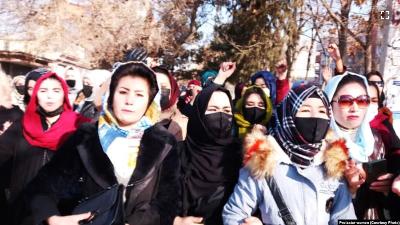Share
Human Rights Voices
While the UN devotes its human rights operations to the demonization of the democratic state of Israel above all others and condemns the United States more often than the vast majority of non-democracies around the world, the voices of real victims around the world must be heard.
Afghanistan, December 22, 2022
Taliban Violently Disperses Women’s Protest Against University Ban
Original source
Taliban security forces have used violence and arrested several people as they dispersed a protest by Afghan women against a ruling that bans female students from universities.
Afghanistan's Taliban announced the decision to forbid women from universities late on December 20 in a letter from the Islamist group's education ministry to higher education institutions, drawing immediate condemnation from the international community and the United Nations.
A group of some 50 women dressed in hijabs, some wearing masks, gathered in the capital, Kabul, on December 22 for a peaceful protest march against the move, chanting slogans against the ban, but were attacked and dispersed by Taliban security forces, participants and witnesses told RFE/RL.
The participants intended to gather outside Kabul University, Afghanistan's largest and most prestigious higher education institution, but switched to a different location after a large number of security forces members were deployed there.
One of the women who attended the march, Basira, told RFE/RL that security forces beat some of the participants and took them away, while others managed to escape. A number of journalists covering the protest have been reportedly detained, too.
Another participant, Shahla Arefi, told RFE/RL that plainclothes female members of the security forces had infiltrated the march and immobilized some protesters who attempted to run when armed Taliban men appeared.
Taliban authorities have not commented on the incident.
On December 22, Turkey and Saudi Arabia became the latest Muslim-majority countries to blast the Taliban authorities' move.
Turkish Foreign Minister Mevlut Cavusoglu, speaking at a news conference with his Yemeni counterpart, said that the ban was “neither Islamic nor humane" and called on the Taliban to reverse the move.
The Foreign Ministry of Saudi Arabia, a country that until recently had also enforced sweeping restrictions on women's rights but has now begun to allow them more liberty, voiced “astonishment and regret” at the Taliban's decision.
The ministry said the move was “astonishing in all Islamic countries.”
On December 21, the United Nations Assistance Mission in Afghanistan urged the Taliban authorities to immediately revoke the decision.
Qatar, which has maintained contact with the Taliban authorities, also condemned the decision.
Inside Afghanistan, where cricket is a hugely popular sport, several cricketers have also condemned the move, while some male students at the medical school of Nangarhar University, in eastern Afghanistan, refused to sit exams on December 21 in solidarity with their banned female colleagues.
In neighboring Pakistan, students at Peshawar University in the northwest of the country staged a peaceful demonstration in support of the Afghan girls' right to higher education, urging the Taliban to reverse the ban.

